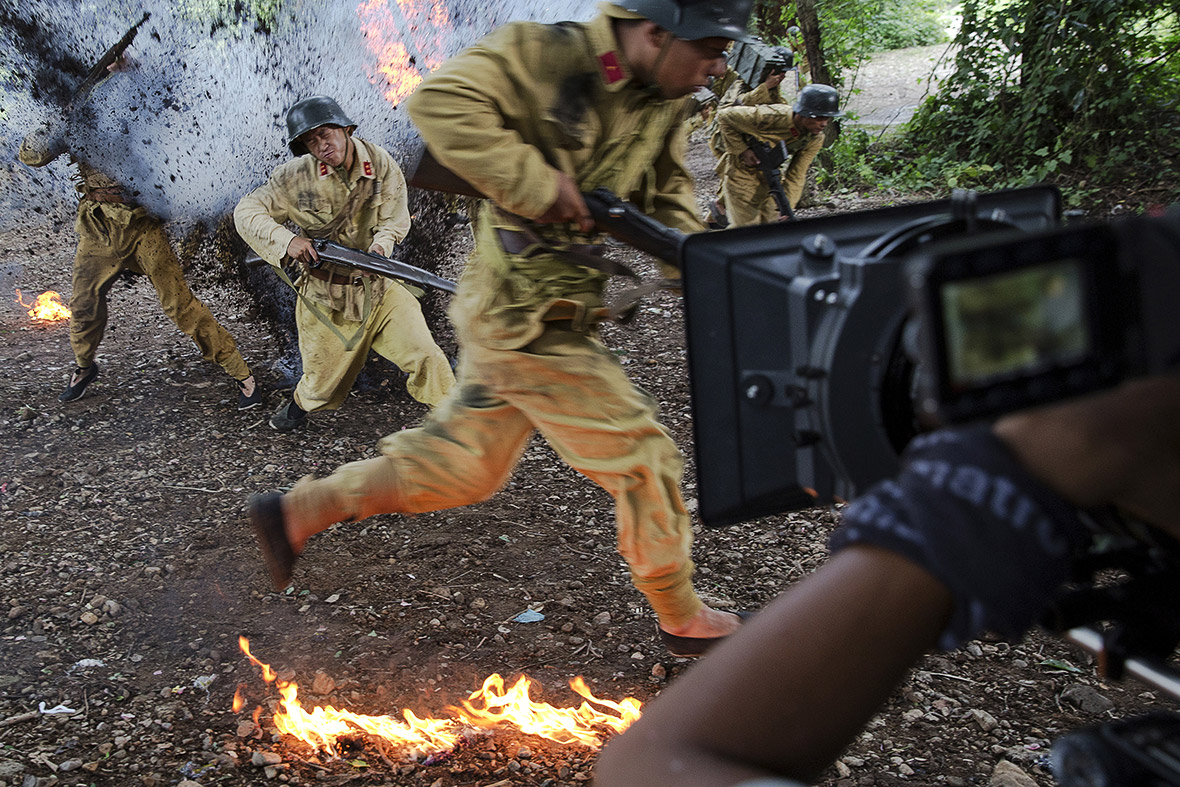China: Behind the scenes of a Second World War anti-Japanese propaganda TV series
Hengdian World Studios – the biggest movie lot ever built – is churning out productions celebrating the end of the Second World War and China's victory over Japan. According to local media, at least 10 new films, 12 TV dramas, 20 documentaries and 183 war-themed stage performances will be released in China to coincide with the 70th anniversary of the end of the war. There is clearly a huge appetite for films that depict the country's glorious triumph over its sworn enemy.
Photographers Kevin Frayer and Damir Sagolj both paid visits to the vast studio complex sometimes called Chinawood. They captured some of the action during the making of productions dealing with the fight against Japan and the subsequent rise of the Chinese communist party. In one scene illustrating Imperial Japan's wartime atrocities, a Chinese soldier lies on the ground covered in blood, a noose around his neck. But there are many, many more dead Japanese soldiers – the film-makers (and, presumably Chinese audiences) clearly take great pleasure in seeing the enemy die in violent explosions, flung into the air like rag dolls.












Many of the huge battle scenes were filmed in one take, complete with explosions and effects, but film productions always involve a lot of waiting around for things to happen. The photographers captured intimate moments, such as the pleasingly anachronistic sight of actors wearing Second World War-era uniforms checking their smartphones and admiring their selfies. Extras playing dead Japanese soldiers look like they have been bored to death as they wait for the cameras to start rolling. One shot, taken behind the costume truck, shows actors standing around in their pants as they change out of a Japanese uniform and into a Chinese one.












The heavy-handed anti-Japanese message is just another salvo in China's ongoing propaganda war against Japan, using its imperialist history to paint them as an oppressive force in the region. China has become increasingly assertive in its dispute with Japan over a group of uninhabited islets in the East China Sea, while it has also been reclaiming land in the South China Sea where Vietnam, the Philippines, Taiwan, Malaysia and Brunei, all have competing claims.
China is staging a military parade on 3 September to mark the anniversary of the end of the war, which its state media calls the "victory of the Chinese People's War Against Japanese Aggression". The country is currently facing its own accusations of aggression. Its military, the world's largest, has embarked upon an ambitious modernisation programme. China says it is a threat to nobody but a front page editorial in the official People's Liberation Army Daily warned: "The situation surrounding our country is generally stable, but the risks and challenges are extremely severe, and the possibility of chaos and war on our doorstep has increased."
The legacy of the war still haunts Japan's relations with China and South Korea, which suffered under Imperial Japan's brutal occupation and colonial rule before Tokyo's defeat in 1945. A refusal by most Japanese leaders to fully apologise for history has long set the tone for strained relations between the two countries and and at times fuelled regional tension.
© Copyright IBTimes 2025. All rights reserved.




















